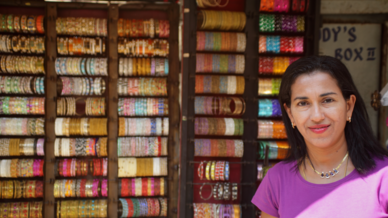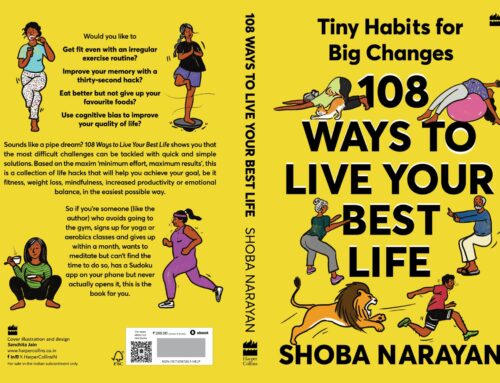Thank you so much, Isabelle Martinetti, for this feature.
We found a quiet spot in the whirling ocean that was the Festival du Livre de Paris and she recorded this interview with a cool tape recorder (need to find out which brand it is).
What I didn’t anticipate was that she would find accompanying photos and stitch it together like this.
Indian author Shoba Narayan shares her sense of ‘terroir’
Issued on:

Author and journalist Shoba Narayan was recently honoured at the Paris Book Festival, where Indian literature was the centre of attention. After more than 20 years in the US, Narayan returned to India to live with her family, publishing The Milk Lady of Bangalore in 2018. She tells RFI why her work resonates with French people.
RFI: Can you describe your years in the US before your return to India?
Shoba Narayan: I grew up in India and then I went to America as a student. I got married, I had kids and then after about 18 years in the New York area I missed my country so I moved back to India, to Bangalore.
India as an adult is a very different experience. When you go to school, you are with your parents, you don’t know anything but when you come and live there and you make connections with all the people, the vendors, the flower sellers … I know all these people, they are part of my life, I’m part of their life … these are the connections that make living in a city very communal, very community oriented.
RFI: What is The Milk Lady of Bangalore about?
SN: La Laitière de Bangalore is about a connection between a dairy farmer, a woman, who sells me milk.
She comes to ask me for money to buy a cow. And she says I will pay you back by giving you milk every day. And I said: “Ok, if I’m giving you so much money then I’m going to come with you to buy the cow.” And then it becomes an adventure, we go to different places and we examine different cows, different breeds.
I learn about farming and about the connection people have with animals and the land. So I become transformed.
I understood how rural India, much like rural France is a very different world. If you live in Paris you can’t imagine what it’s like in rural France. It’s the same as an Indian city.
I live in Bangalore. You can’t imagine what it’s like to be a farmer so it’s about that.
RFI: What can you tell us about Bangalore?
SN: Bangalore has about 20 million people, in India it’s called the technology capital. They call it “Silicon Valley”. A lot of big tech firms have their offices in Bangalore.
In that context, when you are surrounded by high-rises, technology and computers, for me to find this milk lady was very unusual.
So I think there’s a contrast between my life, a fast paced city, living in an apartment in a highrise and then dealing with a farmer, getting to know her life.
RFI: How can your book reach a French audience?
SN: More than anything, my book is about terroir in the French sense. Because they say for example, every state has a different breed of cow. In India, there used to be 108 breeds of cows. Now there are about 80. Some have gone extinct. Each cow gives a different type of milk that is linked to the land where they live. Each cow has a different size.
They look different, they act different, they give different milk.
This sense of terroir is something that French people have very instinctively, with the wine and the cheese.
In fact, one of the quotes in my book is when I interviewed somebody who is trying to sell the milk of a cow that is very expensive and he says: “Madame, you are bargaining with me for this milk but we should market this the way the French market cheese because it is as precious, as good but we don’t know how to market this in India.”
So I said maybe I should pay that money to buy that milk because the quantity is low like the wine in Burgundy that sells for so much money.
Certain cows in India give very little milk but the quality is so good, so the price is high. But in India we don’t know how to value quality like the French do.
RFI: Had you been to France before going to the Paris Book Festival?
SN: It’s my fourth time in France and first time at the Paris Book Festival. I’ve been to many countries and I think what makes France different is that it is still a culture that values ideas and intellectual books.
The person who brought me here is an “attaché for books and ideas”. I don’t think many consulates who are based in India will have that particular title.
I think it’s very lovely to be here, I enjoy wine a lot, I write about it. From here [Paris] I’m going to Bourgogne and then Provence for a week to enjoy the gifts of the countryside in France.
► Find more on Shoba Narayan’s website.




Leave A Comment